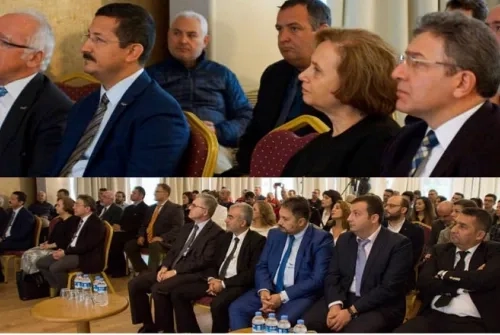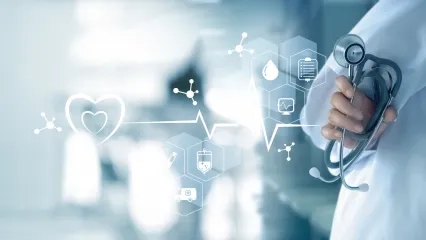Alo Yeditepe
"The Importance of Emergency Response in Disasters Discussed by Experts"
Organized for the second time this year by Yeditepe University, the 'International Istanbul Disaster and Emergency Medicine Symposium' brought together leaders from AFAD (Disaster and Emergency Management Authority) and UMKE (National Medical Rescue Team), as well as experts in the field of medicine. They highlighted the significance of emergency response during disaster situations and the importance of preparedness before disasters.
During the 'International Istanbul Disaster and Emergency Medicine Symposium', organized for the second time this year by Yeditepe University, leaders from AFAD (Disaster and Emergency Management Authority) and UMKE (National Medical Rescue Team), as well as experts in the field of medicine, came together to emphasize the importance of emergency response during disaster situations and preparedness before disasters.
The symposium, aimed at raising awareness about measures to be taken before and after disasters, as well as providing first aid during disaster moments, was attended by Prof. Dr. Kemal Memişoğlu, the Provincial Health Director of Istanbul, AFAD and UMKE leaders and staff, Prof. Dr. Canan Aykut Bingöl, faculty members, and students from the university's Search and Rescue Club.
"Everyone Who Touches Human Life is a Hero"
In his opening speech, Istanbul Provincial Health Director Prof. Dr. Kemal Memişoğlu emphasized the increasing precautions taken in Turkey, especially since 2002. He stated, "All our colleagues working in these matters are actually heroes because this work is based on voluntarism and should be done with love. Turkey is a country with earthquake expectations. Everyone has responsibilities in this regard. The steps to be taken during a disaster should be clear. Society should be educated about this. People should know what to do."
"66 percent of Turkey is at first and second-degree earthquake risk."
Providing information about the activities of the National Medical Rescue Team (UMKE) that has been operating since 2004 and the rescue operations it has participated in until now, Dr. Eray Çınar, the Head of Disaster and Emergency Management Authority, emphasized that the most crucial point in disaster prevention is preparation. He stated, "The more prepared we are, the easier we can reduce the damage." Dr. Çınar pointed out that Turkey is a region highly prone to disasters, and when it comes to earthquakes, approximately 66% of the country is under the threat of first and second-degree seismic risks.
"The shortcomings revealed during the Marmara Earthquake have been addressed."
AFAD (Disaster and Emergency Management Authority) Intervention Department Head Abdülkadir Tezcan stated, "Preparation, risk reduction, intervention, and recovery processes exist. The most crucial aspect of risk reduction is awareness. We cannot escape disasters, but our level of readiness is determined by these programs. Earthquakes, landslides, floods, avalanches, and similar disasters are possible, but we live in a region most affected by earthquakes. In this regard, when we look at our fracture moments, the impact of the August 17, 1999 Marmara Earthquake was significant. Over 17,000 people lost their lives, and more than 43,000 were injured. Access to the region was difficult. Over 70,000 rescue personnel, including 64,000 soldiers, were involved. It became clear during this disaster that we lack professional search and rescue personnel. We also have shortcomings in national coordination. We do not have a well-established plan for disaster moments. All these factors pushed us to become more organized and prepared. Comparing the Marmara Earthquake with the Van Earthquake in 2011, one took 4.5 hours to begin search and rescue operations, while the other took 30 minutes. Communication lines were restored in 12 hours in one case and 2 hours in the other. Apart from these, a more systematic approach was followed, and the insurance system was put into order," he said.
"We Will Provide Workforce to AFAD and UMKE"
Prof. Dr. Canan Aykut Bingöl stated that they have about 43 clubs in their university, and one of the most valuable among them is the Yeditepe Natural Disaster Search and Rescue Club (YUDAK). She mentioned that YUDAK is actively working in places with high drowning incidents such as Şile and the Black Sea during summers. They have saved over 350 lives so far and also participate as volunteers in AFAD's operations. They were involved in finding missing mountaineers during the Van Earthquake. The university is organizing certificate programs in this field and will soon start master's degree programs. They aim to provide workforce to institutions like AFAD and UMKE.
Alparslan Erişti, a student involved in YUDAK, mentioned, "We have received training from various institutions and became certified. I have been involved in club activities for the past 4 years. We try to contribute to our new members. There have been instances where we intervened in fires during our shifts at the fire department." He talked about their work and efforts.
"Basic Information Saves Lives"
Highlighting the importance of first aid knowledge during natural disasters, Dr. Mustafa Ferudun Çelikmen, a faculty member at Yeditepe University Faculty of Medicine's Emergency Medicine Department, stated, "There is a difference between rescuing people from under the debris and providing appropriate medical support. You can rescue a casualty, but if you can't administer proper medical assistance, you may lose the patient. Unfortunately, we have witnessed such examples. Especially academics in medical education should raise awareness among their students about disaster medicine education. This education should also be provided to the public. For instance, during the August 17 Earthquake, bystanders tried to give fruit juice to those rescued from debris. Although well-intentioned, this approach could have been deadly. When potassium cells are destroyed, there is an element released into the circulation, and these fruit juices are rich in potassium. Such information should be known by the public. In such situations, the safest option is to give water. Lives can be saved through these simpler methods."
"We are Among the First in the World in Search and Rescue and Health Teams"
Stressing their leading position in rescue and health teams globally, Prof. Dr. Doğaç Niyazi Özüçelik, a faculty member at Istanbul University Cerrahpaşa Faculty of Medicine, stated, "When it comes to international events, we are among the first countries to be called for assistance. For instance, recently AFAD teams were sent to Indonesia after the earthquake. We also have preparations in our own country. The key here is prevention rather than treatment. Measures like constructing buildings on solid ground and reevaluating urban planning need to be taken. This is not solely the government's responsibility; citizens must also be attentive. For instance, having structures in riverbeds leads to disaster during floods. The most important aspect here is awareness. We live in a country where the likelihood of encountering a disaster is high. Mentally preparing for this situation is crucial. We need to know where and how to react. If we are mentally prepared, the subsequent processes will be smoother."
"Turkey is in a Better Situation Than Egypt"
Muhammed Elgazzar, a faculty member at Yeditepe University Faculty of Medicine, who has been serving as a physician in conflict zones for years and most recently, for the past 2 years, has been dealing with the health issues of Syrians on behalf of the World Health Organization in Gaziantep, Turkey, and has now started his duty in Egypt, stated, "During my previous work in Egypt, I have been in regions affected by natural disasters. I served as a physician during a major storm and flood caused by the overflowing of the Nile River. In terms of preparedness for natural disasters, Turkey is in a much better position than Egypt. I am pleased to be working in Turkey on this matter."


